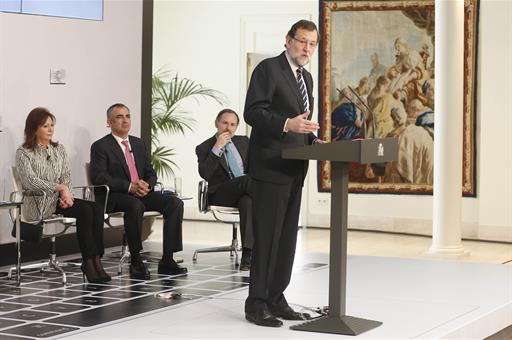Mariano Rajoy stressed there is "no turning back" on commitment to e-government
President's News - 2015.2.19
Moncloa Palace, Madrid
After outlining the reforms pushed through by his government, Mariano Rajoy stated that these all share the common aim of "modernising Spain and placing our country in line with the times". Because he asserted, "if we want to create a new cycle of economic prosperity and job creation laid on solid foundations, we cannot use tools of the past if looking to the future, but rather we need to employ the best tools available today".
Mariano Rajoy commented that, according to the Labour Force Survey (Spanish acronym: EPA), 415,000 jobs were created in the private sector and 18,000 in the public sector last year. In his opinion, these figures are sure signs of a new model of growth within the Spanish economy. "Intense job creation in the private sector and only those necessary in the public sector, in order to guarantee the provision of quality services, without increasing the size of the bureaucratic machine".
Driving e-government
Pool MoncloaAfter stressing that "developing our public sector means a definitive drive towards e-government", the President of the Government pointed out that this is a commitment "with no way back" because it is the only way to guarantee excellence in the provision of services to our citizens and because this is an asset in terms of gaining economic competitiveness.
In this regard, Mariano Rajoy stated that e-government must offer "fast, secure and comprehensive services" so that citizens can handle their paperwork with the various public administration services through a single procedure. He also explained that the benefits of e-government are many. On the one hand, it is permanently open and available (365 days a year, 24 hours a day) and it is accessible from anywhere with an Internet connection. In addition, this has been extended to 8,117 Spanish municipalities - the digital divide has been closed - and we now have fast, ecological and secure public services.
Future administration will be digital
Mariano Rajoy explained that the measures adopted to date are now bearing fruit. "99% of processes with Central Government can now be performed electronically, and regional governments and many local councils are also signing up to this global strategy". He added that this also translates into savings. "If those processes that can now be performed electronically had to be done at an actual counter, the cost for citizens would be some 20 billion euros higher".
Pool MoncloaDespite everything, he added, "there is still a long way to go in the coming years", and "ICT (information and communication technologies) have become one of the pillars of the majority of the measures proposed by the Commission for the Reform of the Public Administration Services (Spanish acronym: CORA)". In this regard, he announced the forthcoming approval of the Strategic Plan for the Digital Transformation of the State Administration and the Draft Bill on Administrative Procedures, with the aim that, for the first time in Spain, there is a unique and systematic law that regulates relations between the public administration services and both citizens and companies.
Before closing, the President of the Government stressed that "we now have public administration services that are as outstanding as our public servants", and "that is a source of pride for us all". For that reason, he added, the commitment to digital e-government is one more step towards modernisation because "if we are to have future administration it can only be digital".
Participants at the event
Chaired by Mariano Rajoy, the event also included the attendance of various members of the government, such as the Vice-President of the Government, Soraya Sáenz de Santamaría and various other ministers. The Under-secretary of the Ministry of the Presidency and President of the Commission for the Reform of the Public Administration (CORA), Jaime Pérez Renovales, was tasked with making the main presentation. In his opening speech, he pointed out that the digital transformation of the public administration is based on two premises: transparency and citizen participation.
At the event, speeches were also given by the Director of Information and Communication Technologies of the Central Government, Domingo Molina; the Managing Director of Fujitsu Spain, María Ángeles Delgado; the Chairwoman of Hewlett-Packard Spain and Portugal, Helena Herrero; the Chairwoman of IBM Spain, Portugal, Greece and Israel, Marta Martínez Alonso; and the Chairman of INDRA, Fernando Abril-Martorell.





